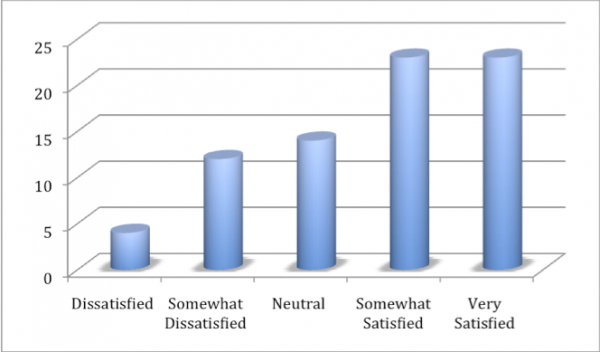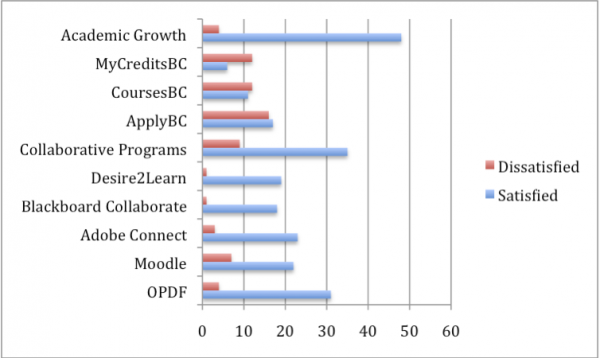We’ve published, for the first time in our history, the results of our Stakeholder Satisfaction Survey in our reports section, along with a report on its findings.
Our work at BCcampus is a mix of innovative projects and operational services, many of which are on the edge of the possible. That is: they are new, developmental and formative. We ask our stakeholders to work in new ways, to collaborate on activities that promise to establish systemic value propositions. As a consequence, we tend to work on the knife-edge, a sometimes-uncomfortable place to be, often asking our stakeholders to take a leap of faith with us. So, when we read and interpret our annual stakeholder survey, it is in the context of innovation and its tensions that we measure our progress.
This year’s Stakeholder Satisfaction Survey tells us that BCcampus is generally well regarded in British Columbia’s higher education sector. However, there were more “neutral” and fewer “satisfactory” responses among our stakeholders than expected. With a 60 per cent approval rating overall, there is ample room to build on goodwill already found within segments of our stakeholders and clients.

Sixty percent is good, but we know we can do better.
While there is lukewarm support for customer service and for our Shared Services and Collaborative Programs and Student Data Exchange Services, there is stronger support for Curriculum Development and Academic Growth. We’ve taken some bold steps in the area of “open” lately and it certainly shows.
There is a general appreciation of our communication efforts and support and understanding of our strategic goals, and that’s certainly something we can leverage.
The audience presenting BCcampus’ main challenge is in information technology and registrar’s offices, many of whom have yet to be persuaded of the benefits of collaboration in system-wide services. We hear that message loud and clear, and we’re taking steps to address those concerns. At the same time we are also taking our message about the strategic importance of systemic collaboration to presidents ands vice-presidents directly, and through their post-secondary sector affiliation groups (RUCBC, BCAIU, BCC)

Our biggest takeaway from what you’ve told us is this: BCcampus spends much effort telling our stakeholders what we’re doing, which is important but not sufficient. We need to listen. When we ask our partners to leap into an innovative technology or process, there can never be too much communication. We need to build awareness, trust and confidence, and create a collegial, open space where feedback is a continuous loop.
We will redouble our efforts to invite our stakeholders to engage with us, to collaborate with us, to offer their wisdom and participate in our projects. Why? because BCcampus can help our partners in the B.C. post-secondary system do what they do better. BCcampus provides the innovative technological infrastructure solutions that can make the whole system move more smoothly and efficiently. BCcampus makes sense, and we have to make sure we’re trusted to deliver on our promise to connect, collaborate and innovate.
We’re still exploring the ways in which we’ll adjust to meet our clients’ and stakeholders’ expectations, but for now we know that we have to:
- Keep a focus on face-to-face communications: meetings, conferences, phone calls and more importantly relationship-building. This means beefing up our client service system at the front lines of day-to-day dealings with stakeholders on an operational level. It also means having our senior management involved in relationship-building on a senior level.
- Codify and quantify those relationships as much as possible through a comprehensive and standardized customer relationship management strategy.
- Find innovative and creative ways to invite stakeholders to be a part of the BCcampus process: meeting and event follow-up, leveraging existing communications tools and focused engagement.
Above all, we’d like you to tell us how we’re doing: suggest ways we can serve the system better, let us know what we’re doing right and where we could do better. You could start by commenting on this article below.
